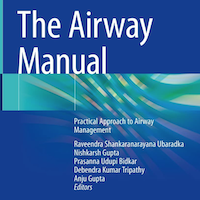Tag: Airway Management
The Airway Manual: Practical Approach to Airway Management
The book provides up-to-date and easy to understand information on airway management with special emphasis on practical management along with required theory background and key points. It covers all aspects of airway management... read more

Tracheostomies The Complete Guide
Tracheostomies: The Complete Guide (2nd ed.) serves as a comprehensive resource for healthcare practitioners and patients navigating the complexities of tracheostomy and laryngectomy care. This edition emphasizes the... read more

Core Topics in Airway Management
Management of the airway is an important and challenging aspect of many clinicians' work and is a source of complications and litigation. The new edition of this popular book remains a clear, practical and highly-illustrated... read more

Longitudinal Changes in Emergency Medical Services Advanced Airway Management
Our cross-sectional study offers important contemporary perspectives of the current patterns of EMS advanced airway management in the US. Using the large ESO dataset, which encompasses EMS events from across the US, we observed... read more
Tracheal Intubation in Critically Ill Adults with a Physiologically Difficult Airway
Using a Delphi method, agreement among a panel of international experts was reached for 53 statements providing guidance to clinicians worldwide on safe tracheal intubation practices in patients with a physiologically difficult... read more
COVID-19 Airway Management and Ventilation Strategy for Critically Ill Older Patients
This book describes the issues and challenges that clinicians encountered in the management of older critically ill patients during the COVID-19 pandemic, and offers practical information on how to manage them. Older... read more

Emergency Department Crowding Impact on Lung Protective Ventilation
Obtaining definitive control of the airway, when indicated, is the responsibility of the emergency medicine physician. Traditionally patients were managed on the ventilator with lung volumes of 10 – 15 ml/kg. However,... read more
Improving Intubation Performance with Airway Registries
Airway registries are used as a crucial tool to monitor and improve intubation performance and patient care. ED airway registries inform and document the efficacy of quality improvement initiatives to improve intubation performance... read more
Improving Outcomes in Patients with Difficult Airways
Evidence indicates that the airway community has successfully conquered the anatomically difficult airway, as these patients are managed safely with a low incidence of morbidity and mortality. In contrast, the literature... read more
Physiologically Difficult Airway Evaluation
Multiple international airway societies have created guidelines for the management of the difficult airway. In critically ill patients, there are physiologic derangements beyond inadequate airway protection or hypoxemia.... read more
Safe Tracheal Extubation After General Anesthesia
Tracheal extubation generates less interest than tracheal intubation. Research, guidelines and clinical anecdotes tend to focus on airway management at the beginning of anesthesia, and it is rare for the challenges of extubation... read more
Etomidate vs. Ketamine for Emergency Endotracheal Intubation
While the primary outcome of Day 7 survival was greater in patients randomized to ketamine, there was no significant difference in survival by Day 28. A prospective, randomized, open-label, parallel assignment, single-center... read more
Endotracheal Intubation vs. Supraglottic Procedure in Pediatric OHCA
The findings of this large cohort study suggest that endotracheal intubation (ETI) in pediatric out-of-hospital cardiac arrest (OHCA), although performed by trained physicians, is associated with a worse outcome, regardless... read more
Head Rotation in Anaesthetised Apnoeic Patients Significantly Increases Mask Ventilation Efficiency
Head rotation of 45° in anaesthetised apnoeic adults significantly increases the efficiency of mask ventilation compared with the neutral head position. Head rotation is an effective alternative to improve mask ventilation... read more
Discordance Between Respiratory Drive and Sedation Depth in Critically Ill Patients Receiving Mechanical Ventilation
Sedation depth is not a reliable marker of respiratory drive during critical illness. Respiratory drive can be low, moderate, or high across the range of routinely targeted sedation depth. 56 patients undergoing 197 bedside... read more
When Could Airway Plateau Pressure is Acceptable in ARDS Patients?
Limitation of plateau pressure (Pplateau) is critical for pro-tection from ventilator-induced lung injury in patients with acute respiratory distress syndrome (ARDS). Limiting to a 30 cmH2O threshold is a widely accepted... read more
New Device for Intubation Through a Laryngeal Mask Airway
On review of the literature, it is abundantly obvious that an endotracheal tube (ETT) with a posterior-facing bevel and curved or tapered tip to center the tube on the scope and reduce hang-up is ideal for intubation over... read more
The Bougie as an Airway Savior
Ever since the BEAM (Bougie Use in Emergency Airway Management) trial was published in JAMA in 2018, the use of the bougie has become increasingly mainstream. Some of the advantages of using a bougie are known, but there... read more
Current airway management practices after a failed intubation attempt
The majority of second intubation attempts were undertaken by emergency consultants and registrars. A change from a non-consultant intubator to a consultant intubator of any specialty for the second attempt and intubation... read more
Computer Tomographic Assessment of Gastric Volume in Major Trauma Patients
In major trauma patients, overall stomach volume deriving from food, fluids and air must be expected to be around 400–500 mL. Gastric dilation caused by air is common but not typically associated with pre-hospital airway... read more
Preventing Major Airway Complications
Every anaesthetist fears the moment they might become faced with a "can't intubate, can't oxygenate" (CICO) scenario, but thankfully such events are exceedingly rare. They nevertheless receive much attention in the academic... read more
Safe Airway Management for the Patient with COVID-19
In this presentation, Dr Ravi Bhagrath, Consultant Anaesthetist at Bart’s Health, London asks Dr Kariem El-Boghdadly, Consultant in Anaesthesia at Guy's and St Thomas' NHS Foundation Trust, London about the IntubateCOVID... read more









